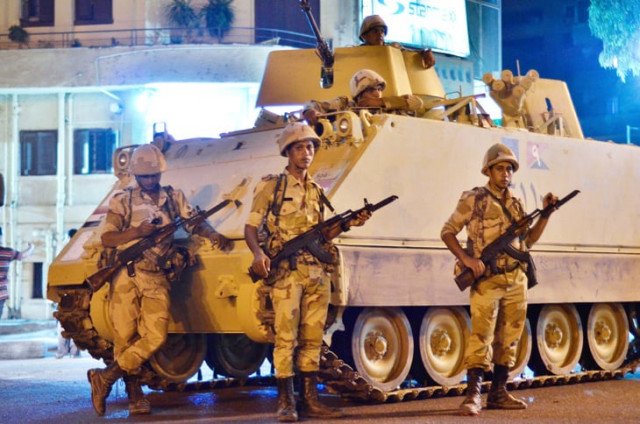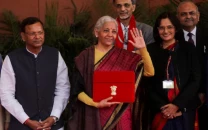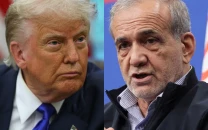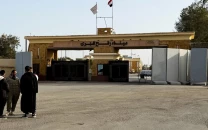Is becoming Pakistan the best Egypt can hope for?
Things in Egypt are so bad that resembling Pakistan is as good as it can realistically get any time soon.

Egyptian Army soldiers patrol the streets outside Cairo University. PHOTO: AFP/FILE
Think of what Egypt was before and after the fall of Mubarak, and what it is now.
Before the Arab Spring the military was Egypt's most critical political body, a stabilising force in a country of weak politicians and weaker governance. That never changed. In fact, it hasn't changed much in the past 60 years.
The same military has deposed Mohamed Mursi, and whether it did so because the people demanded it or because the military wanted it is beside the point.
Mursi is gone, the constitution offers no effective oversight of the military, and the fate of the country still rests with a few select generals.
As we ponder Egypt's foreseeable future, there are no attractive options.
Egypt's least worst option?
Pakistan, if it should be so lucky.
Things in Egypt are now so bad that resembling Pakistan is as good as it can realistically get any time soon. The worst possibility is outright state failure.
The outcome is in the military's hands.
Egypt's situation already bears similarities to Pakistan's, where the military is central, broadly popular, and the country's primary economic force.
In both countries, the military understands that actually running the country, or at least being seen as running the country, is the worst way to consolidate power while avoiding public fury when things go wrong.
Today, the main difference with Pakistan's military is that Egypt's is now seen as responsible for the day-to-day functioning of governance.
The generals will once again go for the Goldilocks approach to forming a civilian government, one that is not too strong but not too weak.
It has to be resolute enough to earn a reputation for competence, and this is where Mursi and the Muslim Brotherhood fell short, but docile enough to not sideline the military or curb its privileges.
Most importantly, the new government needs to seem sufficiently independent to take flak and "own" the blame for any economic woes. The last thing the military wants is for the next wave of protestors to aim their anger at the army.
Can the military pull this off?
Can it empower a government that earns enough public confidence to restore stability to the country and allows the military to distance itself from economic management and domestic politics?
There are plenty of looming obstacles.
The military's killing of more than 50 pro-Mursi protestors underscores the growing rift between the Muslim Brotherhood and armed forces. It's not hard to imagine a scenario in which the military, claiming the Muslim Brotherhood is evolving into an insurgency, chooses to again make the party illegal, as it was under Mubarak.
The military is in a race against the clock.
The interim transitional government has laid out a timetable for new elections that is undeniably too ambitious. The six month timeline leaves only four months for redrafting the constitution, a process that is destined to take much longer. The chance of protracted civil conflict is very real and growing.
But don't rule out the military's success. In the wake of the coup, two supportive Gulf countries, Saudi Arabia and the United Arab Emirates, sent a clear message with their checkbooks. Aid to the tune of $8 billion demonstrated that the military is the perceived best bet to provide stability in a country that is too big to fail.
Of course, the Pakistan model is a very low bar to set for governance.
Pakistan has been racked with internal security issues, and a democratically-elected government successfully finished its entire term for only the first time this year.
Egypt has another critical difference from Pakistan, one that comes with great risks and rewards. There is an empowered, vocal, active civil society. The "rebel" signature of the protests is what made Mursi's ouster possible. A similar civil activism is what drove out Mubarak too.
It is this active civil society that complicates the military's path from here to a Pakistan model of governance. But while Egypt is a far way off from having the kind of democratic elections that we celebrate in emerging markets like Brazil and Turkey, it possesses a similar type of civil society, one that could, in the future, make such a system possible.
In the meantime, it is best to hope the military has firm dominion over the country and can avoid violent crisis in its bid to establish a viable government.
Author Ian Bremmer is the president of Eurasia Group, the leading global political risk research and consulting firm.
Bremmer created Wall Street's first global political risk index, and has authored several books, including the national bestseller, "The End of the Free Market: Who Wins the War Between States and Corporations?", which details the new global phenomenon of state capitalism and its geopolitical implications.
He has a PhD in political science from Stanford University (1994).
__________________________________________________________
[poll id="1171"]



















COMMENTS
Comments are moderated and generally will be posted if they are on-topic and not abusive.
For more information, please see our Comments FAQ